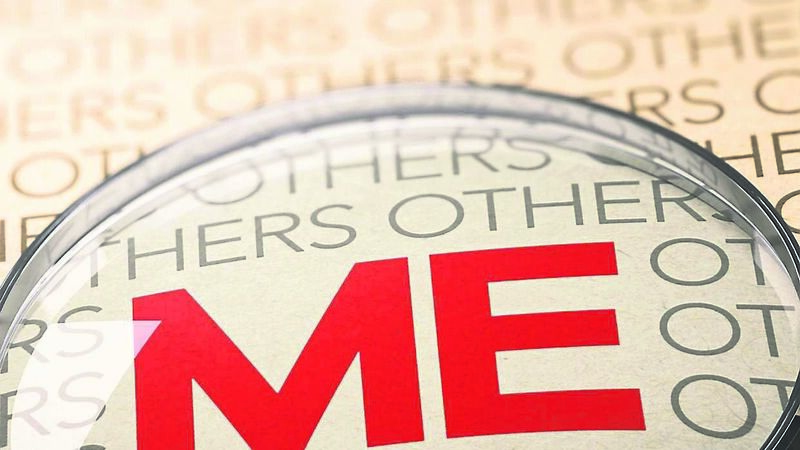Think you know a narcissist? Here’s what they’re really like

Ailin says the internet’s absolutely buzzing with information about this condition and the toxic impact it can have on other people.
“She’s a narcissist,” my friend declared. “I looked it up.”
Someone else talked about an elderly neighbour who expected constant help in terms of running messages, and fixing household appliances, but who was never particularly grateful or helpful in return and hilariously fast to shut the door in the helpful one’s face once a job was done.
“Narcissist” was the disillusioned householder’s eventual diagnosis.
I started to notice other acquaintances using the word. They mentioned that they had consulted experts and studies through online podcasts and articles to help them navigate difficult relationships with people they had come to believe were narcissistic parents, siblings, offspring, relatives or co-workers.
Intrigued, I searched online myself. Apparently there’s an epidemic of it. Once you go looking, the internet’s absolutely buzzing with information about this condition and the toxic impact it can have on other people. A whole host of psychologists, lawyers and authors are offering advice online and in books on how to identify and protect against the impact of narcissistic behaviour in the workplace and the home.
“Seems to be a bit of a pandemic going on,” I thought.
Hmm. If you’re interested, the characteristics are said to include an overinflated sense of self-importance, grandiosity, feelings of superiority, a sense of entitlement, a need for excessive admiration and being at the centre of attention, being highly manipulative, engaging in pathological lying, demonstrating a willingness to take advantage of others and a lack of real empathy, understanding and consideration for others, an unwillingness to take on board anyone else’s point of view, refusing to be accountable, constantly presenting yourself as a victim, prioritising your needs above everything and everyone. Phew.
Most of us know people with a few of these characteristics. But that doesn’t make them narcissists. Narcissism, it’s believed, exists on a spectrum; to an extent there are traits that most of us possess to some degree, and in fact, it’s believed that a certain amount of self-centredness is healthy. We can’t all be Mother Teresa, now, so it’s a bit unfair to throw the term around too much when someone appears to be a bit self-centred or is showing off a bit.
On the other hand, there are recognisable elements to watch out for if you’re in a relationship of some kind with a full-blown narcissist. One woman recalled her experience with an adorable man who initially love-bombed her, bombarding her with intensely admiring texts and phone calls.
Basking in the warmth of his attention and apparent admiration, she bared her soul to this apparently empathetic, wonderful man, sharing her deepest secrets. Which he then used against her. Narcissists use vulnerability as a weapon. Suddenly he had the upper hand and the woman found herself constantly desperate to get back into his good graces. The understanding was that if she could just stop behaving in ways that upset him, he would definitely be able to love her back. Huh?
Another woman recalled how, after a great start, she found herself being blamed for everything that went wrong in the relationship. Every disagreement ended up the same; she was at fault, he the victim. She ended up walking on eggshells. Whenever she asked about his background, he portrayed himself as a victim, blaming teachers, his parents and eventually, even her, for his lack of success, whether it be in education, sports or work.
They’re also great at gaslighting, which is the way someone manipulates somebody else into questioning their own sanity, their powers of recall or their reasoning ability; in other words, twisting a person’s sense of reality to the point where they don’t trust themselves. This could mean being abusive and then blandly denying the abuse ever happened. Or telling somebody he/she is crazy and that everyone else believes they’re crazy too. They refuse to take responsibility, saying “I’m sorry you think I hurt you.”
They may declare the other person “isn’t making sense” or is being too sensitive. They may insist that someone’s memory is bad because he or she doesn’t recall getting, for example, a message about a workplace meeting that was, in reality, never sent.
Another anecdote detailed how that from the time she was in her 20s, one victim’s sister demanded to be the centre of attention without ever reciprocating the help she got. The other sibling helped her endlessly, an experience she later described as pouring heartfelt effort down a black hole. Sometimes, she recalled, there was the pretence of gratitude, but it had a “limp-rag, perfunctory quality” about it, she said.
Narcissists also “project” their emotions onto others – for example one partner may accuse the other of wanting to leave the relationship when it is really the accuser who’s thinking of leaving. Seeing their apparent distress, the other spouse apologises and tries to make amends, believing they are somehow in the wrong. The victimhood is a form of blame-shifting which allows the ego to remain intact, allowing the narcissist to blame the world while gaining validation from other people. He or she garners sympathy from others, acquires the resources they need, maintains a sense of control and confuses the facts about who’s really at fault in a toxic situation.
To preserve their own reputation and gain sympathy, the narcissist may quite casually speak ill of another person or make false accusations about them. It’s fascinating. It’s also a bit terrifying. If you ask me, from what I read, once you come up against the real thing, the best thing to do is run.







 App?
App?




